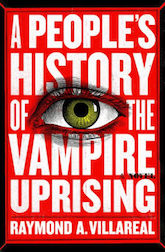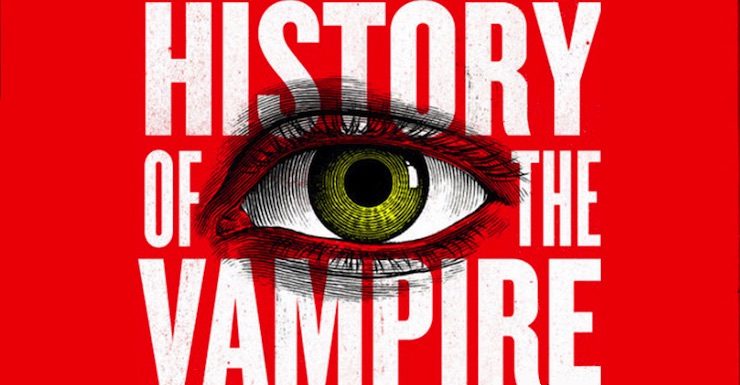A People’s History of the Vampire Uprising is Raymond A. Villareal’s debut novel. Billing itself as a “panoramic fictional oral history,” it purports to take the oral accounts of various different people to construct a narrative of the rise of vampirism in the modern United States. Its first-person narrators include Lauren Scott, a research physician from the Centre for Disease Control (who inexplicably fails to correct the vast number of people who call her “Miss Scott”); an FBI agent called Hugo Zumthor; a political fixer called Joseph Barrera; and Marcy Noll, a member of the political establishment who ends up on the National Security Council. As part of its constructed narrative, it also includes a set of “transcripts” from interrogation interviews of an American Catholic priest and Jesuit brother, Fr. John Reilly S.J.
I wish I could say otherwise, but it really isn’t all that good. It sounds like it should be good—it sounds like it could be World War Z but with vampires—but in reality, it’s an overambitious mess without anything like a narrative arc, and filled with characters who are at best shallow caricatures of real people and at worst are unmitigated cardboard cutouts around which the author hangs incidents that in other hands might actually feel like they mean something, but here are just one damn thing after another.
Buy the Book


A People’s History of the Vampire Uprising
Maybe I’m bitter. Maybe it’s because a book about a disease that leads to vampirism—a “people’s history” of a disease that leads to vampirism—seems like it should really have an international element, but A People’s History of the Vampire Uprising is deeply American-centric and I am very tired of stories that treat America as all of the world that matters. Maybe it’s because where A People’s History of the Vampire Uprising isn’t wholly concerned with the American political landscape, it’s focused on the inner workings of the Catholic Church, and the Catholic-y parts seem to assume that no one in the Church is motivated, in whole or in part, by genuine and considered religious sentiment that has rigorous intellectual backing. As an ex-Catholic, much as I dislike the entire institution, even I have to admit that’s far from accurate, but Villareal’s Church is home to scheming monsignors, a drunken Irish priest, and a Jesuit who really doesn’t seem particularly Jesuitical. (All the way down to not appearing to have followed a regular Jesuit formation—but even aside from the fact his career seems to be upside down, Fr. Reilly doesn’t even have a particularly good argument for breaking his oaths of obedience to his oath and his pope, and one expects a Jesuit to have a good argument, at the very least.)
I don’t think I’m bitter. On top of these issues, A People’s History of the Vampire Uprising is largely incoherent as a narrative. It begins when Scott is called in to assess a possible new disease in Arizona. Over the course of several months and several other viewpoints, the reader learns that this disease looks a lot like vampirism. Vampires (“Gloamings”) make inroads on equal rights and political power in America and in the Catholic Church. There is an ongoing question of murder and conspiracy: are vampires murdering humans for blood? Who is responsible for thefts of large amounts of gold? Are vampires or a faction thereof planning on causing (and surviving) global nuclear winter and keeping humans for food? Is vampirism a disease to be cured or are vampires the new model minority? (I’d really prefer not to get in to how poorly this book works when it turns to discussing civil rights and making analogies, but it struck me as fairly tone deaf.)
A People’s History of the Vampire Uprising asks these questions, and doesn’t trouble itself to answer them. (Perhaps it’s “Part One,” and “Part Two” is forthcoming?) Of course, its largest conspiratorial strand, the Catholic Church one, is told through Reilly’s interview transcripts, and these transcripts don’t read like an interview at all, but rather a bog-standard first-person point-of-view narration (albeit one with occasional interjections), Reilly is not particularly well-developed as a character or as a Jesuit, and his narration is, on top of not being believable as a transcript, not particularly compelling, either.
My reaction to most of A People’s History of the Vampire Uprising can be boiled down to: why should I care about any of this? That said, there was enough in it, if barely, to keep me reading, though I confess to having been hoping for a somewhat better resolution to the conspiracy plotline (and some more character development for Dr. Scott) than actually turned out to be the case.
A People’s History of the Vampire Uprising is a novel about which I would like to be engaged enough to be scathing. But it’s hard to be properly scathing about something so deeply mediocre. I’m sure that it will speak to some people: for me, it fails to even be interestingly bad. It comes across as slapdash but self-important, and that’s a mode of art that’s absolutely not my scene.
A People’s History of the Vampire Uprising is available from Mulholland Books.
Liz Bourke is a cranky queer person who reads books. She holds a Ph.D in Classics from Trinity College, Dublin. Her first book, Sleeping With Monsters, a collection of reviews and criticism, was published in 2017 by Aqueduct Press. It’s a finalist for the 2018 Locus Awards and is nominated for a Hugo Award in Best Related Work. Find her at her blog, where she’s been known to talk about even more books thanks to her Patreon supporters. Or find her at her Twitter. She supports the work of the Irish Refugee Council and the Abortion Rights Campaign.










